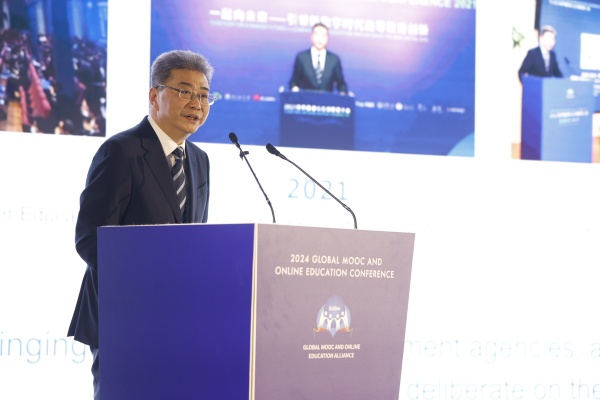
- Home
- Media Center
-
Events
- Wuzhen Summit
- Regional Forums
- Practice Cases of Jointly Building a Community with a Shared Future in Cyberspace
- World Internet Conference Awards for Pioneering Science and Technology
- The Light of Internet Expo
- Straight to Wuzhen Competition
- Global Youth Leadership Program
- WIC Distinguished Contribution Award
- Membership
- Research & Cooperation
- Digital Academy
-
Reports
- Collection of cases on Jointly Building a Community with a Shared Future in Cyberspace
- Collection of Shortlisted Achievements of World Internet Conference Awards for Pioneering Science and Technology
- Reports on Artificial Intelligence
- Reports on Cross—Border E—Commerce
- Reports on Data
- Outcomes of Think Tank Cooperation Program
- Series on Sovereignty in Cyberspace Theory and Practice
- Other Achievements
- About WIC
- 中文 | EN

AI's future role in education explored at London conference

Vice-Minister of Education Wu Yan makes a speech at the opening ceremony of the 2024 Global MOOC and Online Education Conference in London on Thursday. [Photo provided to China Daily]
Universities in China and the rest of the world are expected to cooperate to harness the potential of digital intelligence and foster a more sustainable higher education system, a senior Chinese official said in London on Thursday.
Vice-Minister of Education Wu Yan expressed the expectation at the opening ceremony of the 2024 Global MOOC and Online Education Conference in the United Kingdom's capital. MOOC means massive open online course.
Wu explained that the digital development of China's higher education sector focuses on application, cooperation and sharing, and capability-building to achieve the deep integration of digital technology and education.
Chinese universities and their counterparts in other countries can work together to create innovative smart education models to promote open cooperation and contribute to a resilient and sustainable higher education system in the digital intelligence era, Wu said.
He also announced that with the emergence of artificial intelligence, or AI, higher education has entered the inaugural year of smart education.
Themed "future higher-education restructuring in the intelligence era", the conference at Queen Mary University of London was jointly hosted by the Global MOOC and Online Education Alliance and the UNESCO Institute for Information Technologies in Education.
Stefania Gianini, assistant director-general for education at UNESCO, said the gathering was a unique opportunity to reflect on how MOOCs and online education can continue to transform higher education alongside deep-level transformation AI training, which provides opportunities for expanded access to personalized learning while raising awareness about equity and ethics.
MOOCs have rapidly expanded access to higher education on a global scale in recent years, she added.
"They have also opened doors for millions of students and learners, creating opportunities for lifelong learning, enriching communities that the traditional education has challenges," Gianini said.
Jacqueline Smith, minister of state in the UK's Department for Education, said AI has the potential to revolutionize higher education in ways we are only just beginning to understand, from personalized learning pathways that cater to individual student needs to AI-driven research that pushes the boundaries of human knowledge.
"The intelligence era has risks, but it also presents us with unprecedented opportunities to enhance learning experiences, to foster innovation and to prepare our students for a future that is both exciting and unpredictable," she said.
The Report on the Digital Development of Global Higher Education 2024 and The Digital Development Index of Global Higher Education 2024 documents were also released during the conference, which was attended by more than 300 representatives from higher education institutions, online education platforms, and government organizations.

The World Internet Conference (WIC) was established as an international organization on July 12, 2022, headquartered in Beijing, China. It was jointly initiated by Global System for Mobile Communication Association (GSMA), National Computer Network Emergency Response Technical Team/Coordination Center of China (CNCERT), China Internet Network Information Center (CNNIC), Alibaba Group, Tencent, and Zhijiang Lab.





